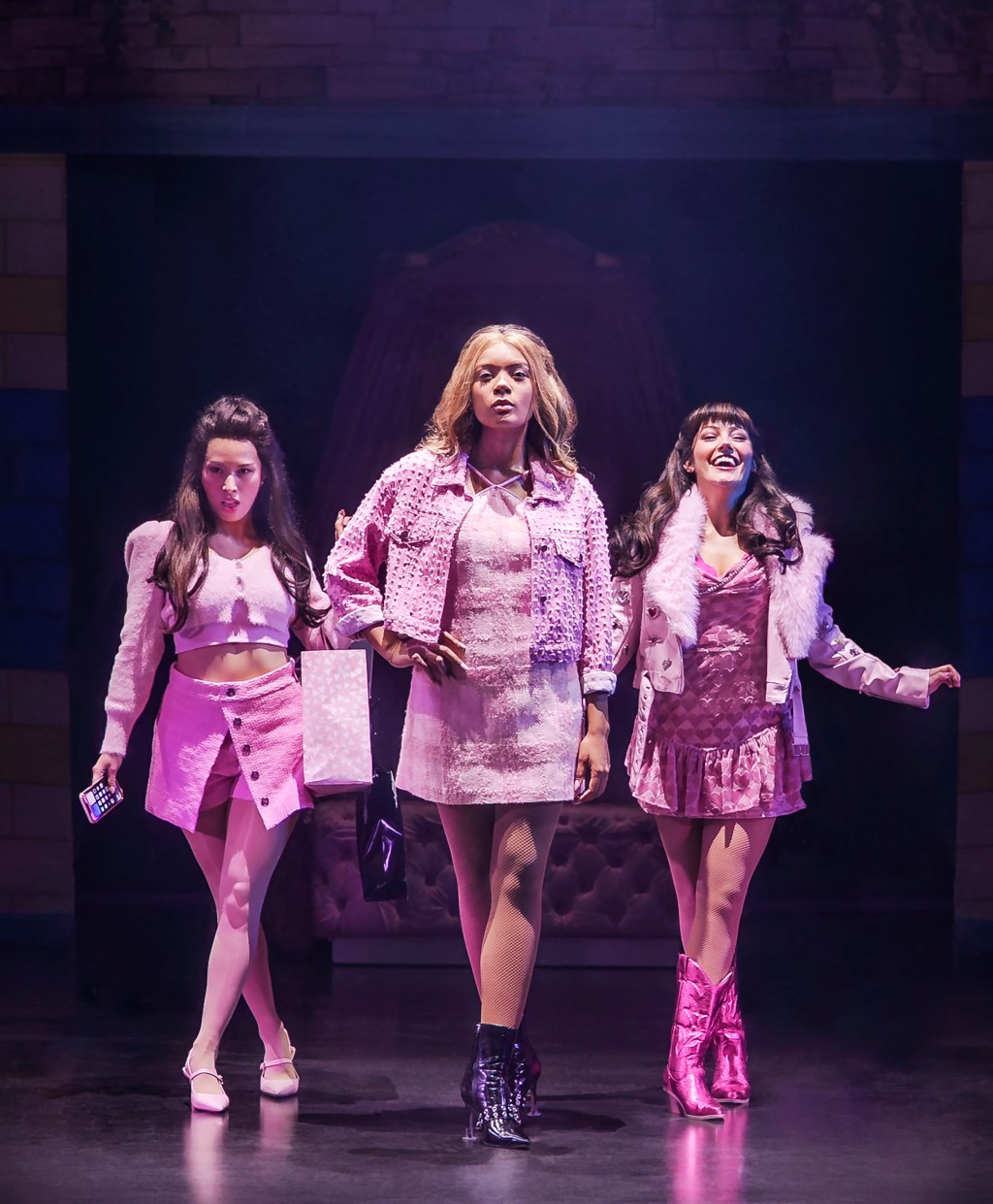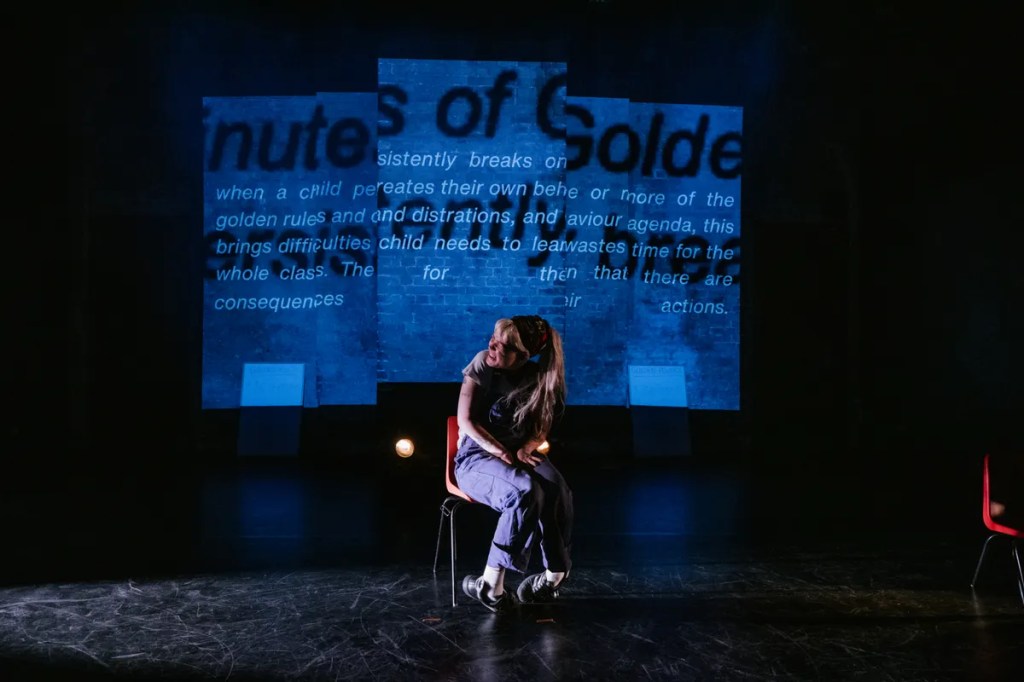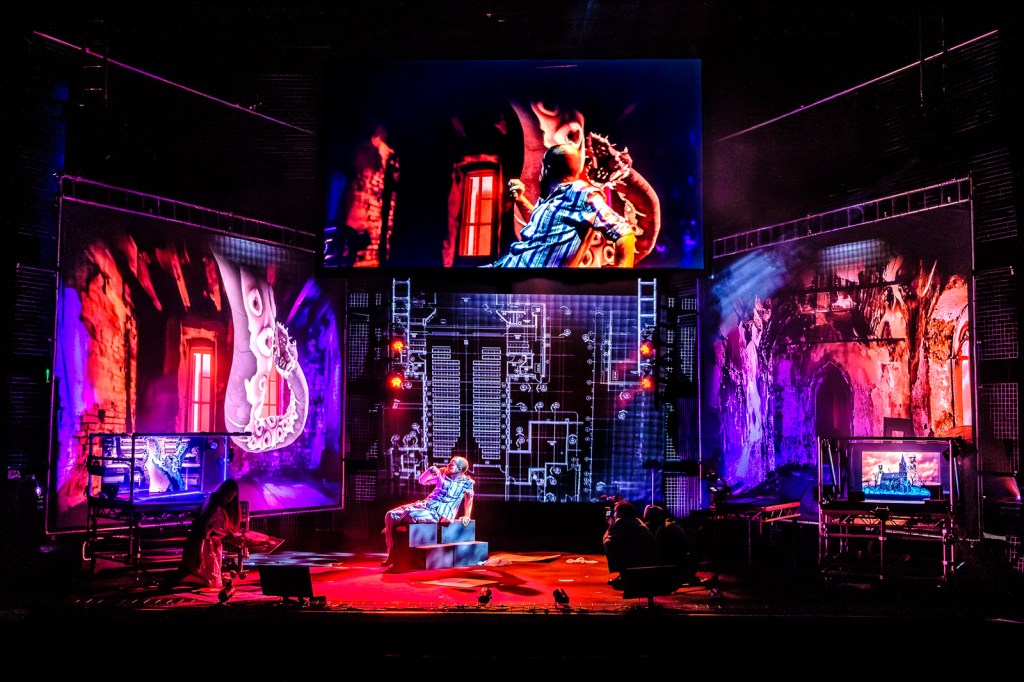★★★★☆
Aladdin and the Magic Lamp, one of the most-famous stories to come out of the Middle-East, is now best-known for its 1992 Disney animated film adaptation. The film was then adapted for the Broadway stage in 2011, ran on the West End from 2016 to 2019, and now, at long last, it is on tour around the UK.
Aladdin was one of my favourite films growing up because it was the best representation I had. Everything else was portraying my people as terrorists (or taxi drivers). But Aladdin is a poor brown-skinned peasant boy who fights monsters and becomes a Prince. The film – and, by extension, its stage musical and live-action film adaptations – has racial problems of its own, but I will always look back at it fondly. Seeing it brought to life onstage in London was exhilarating – and it was even more exciting getting to see it again on my home turf!
Before the performance began, I interviewed a few local celebs on the red (or, rather, purple) carpet to find out their three wishes. Sadly, I could not grant them their wishes, but Disney provided us with a show more magical than any wish.
The stage musical adaptation makes some big changes. It would be foolish to base the Genie on the late, great Robin Williams’ iconic characterisation so the creatives went a different route. Every production stars a Black man who takes on the role of an African-American comedian. It’s a demanding role that requires a versatile actor who is capable of speaking and singing in a large number of ways. Yuekayi Ushe might be much smaller than most the men who have played the role previously but his voice is just as big. He is exuberant in the role.
Another major change is that the production does away with the animals! Aladdin’s pet monkey, Abu, is replaced with a trio of loveable misfits; Jasmine’s pet tiger, Rajah, is replaced with a trio of sassy ladies-in-waiting; and Jafar’s pet parrot, Iago, is human.
Whilst Disney throw a lot of cash at their production, they must have deemed this impractical – and they likely did not want to do something similar to The Lion King. The changes work fine, and you soon forget about the animals, though Abu is missed at first. However, Aladdin’s pals – Kassim (Nay-Nay), Omar (Adam Taylor), and Babkak (Nelson Bettencourt) – are so outrageously funny that I would not want to lose them if a future production wanted to replace them with Abu.
The script pokes fun at the changes, with Jafar (Adam Strong – who chews up the scenery and leaves no crumbs) asking Iago (Angelo Paragoso – who is wonderful as the archetypal, dumb, villainous sidekick), “Must you parrot everything?”
The script is pretty solid. There are plenty of Middle-Eastern jokes and puns, from one of Aladdin’s friends mishearing words as items of food, from “falafel” to “tabouleh” (it was clear that the majority White audience were familiar with falafel but not tabouleh!) to another character complaining about “Every Tom, Dick and Haseem.”
Some people complain that the script is a bit pantomime-y, but it is unashamedly a family show – and, like a pantomime, there are some jokes and references for adults.
The slapstick humour is part of the show’s appeal but sometimes it falls a little flat, especially because some of the references are dated. There are a few updated references that have clearly only been added recently, and there are some timeless references (e.g. the Genie exclaiming, “You get a wish! You get a wish! You get a car!”), but a few references, e.g. “Ain’t nobody got time for that” (which is almost as old as the show itself), feel a bit cringe.
The musical uses all the songs from the film, three songs that were written for the film but not used, and four new songs. The seven non-film songs are great but they lack the majesty and thrill that made the film numbers so aurally awe-inspiring. Sure, the film numbers produce an undeniable nostalgia in audiences, so it is easy for one to dismiss the non-film songs as “not as good” – but they’re just not.
However, all the numbers are a feast for the eyes. The opening number, ‘Arabian Nights’ (led by the Genie, who introduces all the key players) is an exciting introduction to Agrabah – albeit much more light-hearted than the dark, chilling (racially problematic) original version.
The biggest number is, of course, ‘Friend Like Me’, which is performed in the Cave of Wonders. This scene lasts forever yet you are left wanting more and more. Ushe shines brighter than an of the diamonds and jewels in the cave. His self-aware Disney medley is hilarious. The tap-dancing segment – in which the show seems to be honouring ‘One’ in A Chorus Line, but with the dancers wearing fezzes instead of top hats! – is thrilling.
The stage design, not only in the cave, is a feast for the senses. There is so much colour. There are more colours than you ever knew existed. There are so many different fabrics and textures. The costumes are so gorgeous that even middle-aged straight White cis men will want to play dress up.
The aesthetic of Aladdin has long been criticised as an oriental spectacle that at best exoticises and at worst festishises the Middle-East. The aesthetic – and indeed the dance numbers – appear to be a fusion of the Middle-East and Bollywood. Disney repeated this in The Princess and the Frog, with Prince Naveen having an identity that seems to be Latin, Middle-Eastern and South Asian in one. It’s a reduction of identities that just groups all brown people together. The fusion of Agrabah is not so offensive – it’s more funny than anything.
The script makes sure to correct some of the flaws of the original. The film, itself, corrected an offensive lyrics in its opening song, ‘Arabian Nights’ – but the musical has made efforts to make the story more a celebration of the culture it is portraying, albeit a cartoonish one. The film went further and actually gave Aladdin and Jasmine clothes, refusing to allow them to become fetishised.
Of course, it is nostalgic seeing Jasmine in that iconic bellydancing outfit, but why is she dressed like that? The European princesses dress conservatively, as princesses did and do, yet Jasmine is dressed like an entertainer. Bellydancers performed in Sultan’s harems; Jasmine is the daughter of a Sultan. Bellydancing was considered a form of prostitution – selling your body for money – but Jasmine is a Princess.
Jasmine is shielded and sheltered by her father yet she rebels so perhaps her liberal clothing (or lack thereof) is a rebellion against cultural norms and restrictions put on women’s clothing in that part of the world.
On the one hand, body and sex positivity are admirable, but on the other – is this sex positivity or just sexualisation?
Criticisms aside, Desmonda Cathabel is delightful as Jasmine. She has the voice of an angel. The script makes Jasmine an active heroine, a feminist role model, and Desmonda, herself a woman of colour, leans into that. Gavin Adams makes his professional debut as Aladdin. His charisma and charm are abundant – right from his first appearance onstage. Jo Servi does well to show the Sultan’s moral complexities. This Sultan is less buffoonish than the Sultan in the film, albeit still easily manipulated by Jafar – and this works much better for the stage, especially because it shows how even level-headed people can be misled.
The cast is flawless – as far as talent is concerned. There is one issue, however – where are the Middle-Easterners? The musical has long been criticised for its lack of Middle-Eastern actors – the original Broadway company had not a single Middle-Eastern actor in its cast. Other races are generally cast pretty accurately but, for some reason, it is acceptable for Arabian and Middle-Eastern characters to be played by anybody and everybody, which takes roles away from Arab and Middle-Eastern actors. Jafar is played by a Middle-Easterner – but ironic, isn’t it, that the only Middle-Eastern actor plays the baddie?
Disney musicals are always racially diverse, and the Middle-East has long been a melting pot of cultures. That’s not the issue. The issue is we are presented with a Middle-East with virtually no Middle-Easterners. It feels colonial.
That said, in the original story, Aladdin was arguably Chinese, or the story might have even been set in China (though some argue that “China” was used simply to mean “a faraway land”). Therefore, casting a Hong Konger as Aladdin might be considered poetic.
Aladdin is a wonderful show that attempts to fix some of the flaws of the original movie but has its own set of issues. The script could do with a little update – ain’t nobody got time for “Ain’t nobody got time for that” jokes in 2024. But, all in all, it’s a spectacle with everything you want in a musical – with the added bonus of nostalgia.
Aladdin runs at Opera House Manchester until July 7 2024 and tours the UK until January 5 2025.
Photo: Deen Van Meer



